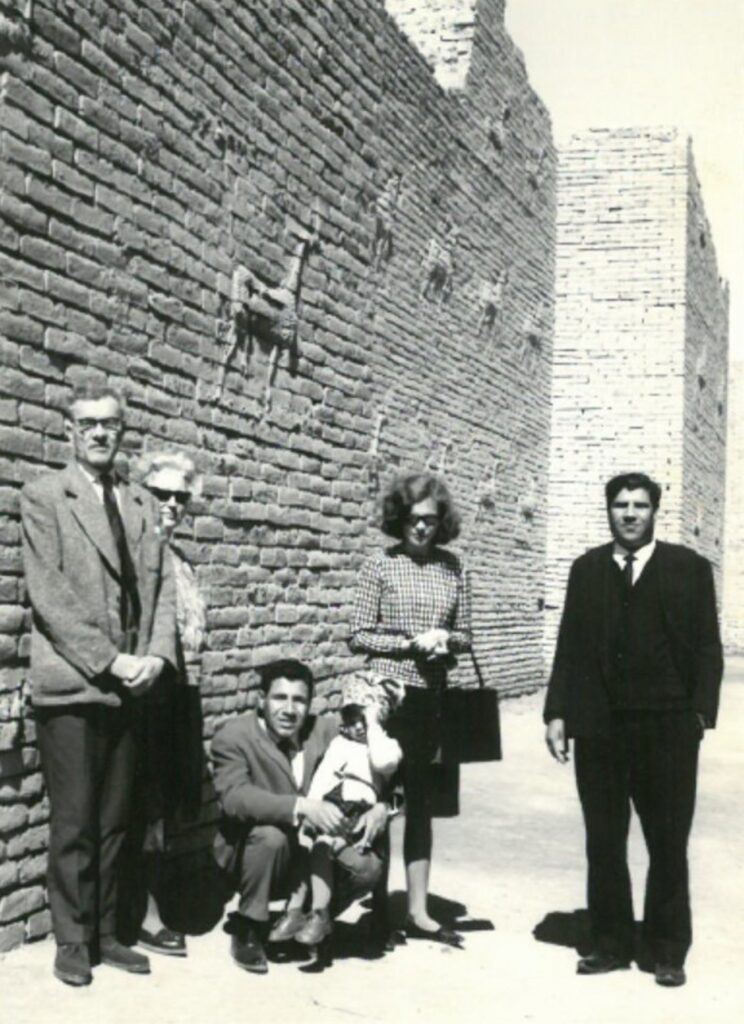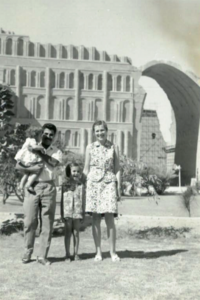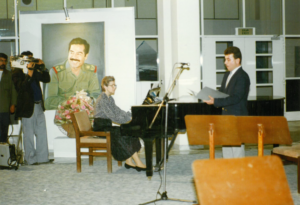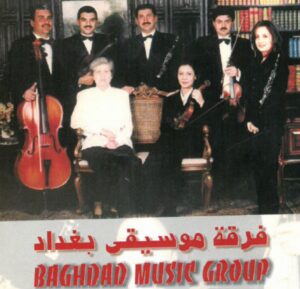Nataša Al-Radi
I was born in 1940 in Český Ráj region as Nataša Cimbálová. My father was a music school teacher. I learned to play the piano at the age of six. My generation graduated from elementary school in the 1950s, and that says a lot. There was a lot of pressure at the time and technical fields were preferred, so I chose the paper and cellulose industry for my further studies. In addition to that, I still played and practiced the piano diligently. My father was interested in yoga, mysticism and Eastern philosophies, and I gradually began to read a lot about these things. I got a job at the Prague Paper Mills company. Through a friend, I also met a young Iraqi man, Yousif Al-Radi. We got married five years later. It wasn’t easy, though. At first, my parents didn’t approve the marriage, but they later came to terms with it. I even had to ask the Ministry of the Interior for permission. After a year of waiting, they first refused, and our marriage was only approved after an appeal.
I stayed alone in Baghdad with his family. Fortunately, I studied Arabic in a language school in Prague for five years
I then left for Iraq on an émigré passport, which meant losing my civil rights and renouncing my pension in Czechoslovakia. My husband studied mechanical engineering at the Technical University in Prague and returned to Iraq in 1965. I joined him in the spring of the following year. At that time, it was difficult to find job there, so when I arrived in Baghdad with my eight-month-old daughter, Yousif had to start work in Kirkuk the very next day (over 250 kilometers away). I stayed alone in Baghdad with his family. Fortunately, I studied Arabic in a language school in Prague for five years, but the standard language is very different from the dialects, so at first I understood “Iraqi” poorly. My husband’s parents, although old people with a traditional upbringing, received me well, as did other relatives, with a few exceptions. But even then it was not easy. The reality was quite different from my expectations. For example, I got typhoid and had to return home for a year for treatment.
I didn’t mind the heat there that much, even though temperatures reached fifty degrees centigrade in the shade, but rather the dust, the lack of natural greenery and culture. I also looked at a number of things differently, such as the status of women in society and the laws influenced by religion. I didn’t have to convert to Islam myself, because my husband’s family was Sunni and marriage was only confirmed by the court, not by religious institutions. But as a Christian, I didn’t have inheritance rights there. However, the poor cleanliness of public spaces bordered me, as well as the unruliness of people standing in line at the store or when boarding the bus, and especially the harassment of men in the crush. But I learned to deal with it “handily and succinctly”.
I realized that I had to do something, not just endlessly dusting, sitting in a room and staring at the wall. I bought a piano, started practicing again, and got a job at the Institute of Fine Arts, later at the Academy, the Music School, I also founded a chamber ensemble, and later played in the orchestra and ballet. My husband took out a loan from the state to build a house. The conditions were quite good. We have two daughters. The elder one studied architecture, the younger one English literature.
Under his rule, terror and strict censorship reigned. Most people hoped that the situation would improve after that
In 1979, I was forced to accept Iraqi citizenship, otherwise I would have been deported. As is well known, further developments in the region took a dramatic turn. The war with Iran, the occupation of Kuwait and the subsequent embargo, and in 2003, the fall of Saddam Hussein’s regime. Under his rule, terror and strict censorship reigned. Most people hoped that the situation would improve after that, life without constant threats and tension. Unfortunately, the opposite was true. For reasons of personal safety, I only went to work with my taxi driver and a group of colleagues, and even that was not without problems sometimes. After fifteen years of such a life, my husband and I decided to leave Iraq for good, for health reasons, fear of attack, kidnapping, and so on. That was in 2018. Since then, we have lived happily in Železný Brod, the older daughter lives near us, while the younger one moved to Sweden. My Czech passport was returned to me after the Velvet Revolution and I now receive a pension, albeit a symbolic one. I have always worked in Iraq as an external consultant. In 2010, I received the Gratias Agit award from the Ministry of Foreign Affairs for promoting the good name of the Czech Republic. I´m also a holder of several awards and medals for lifetime work from the Iraqi government.







